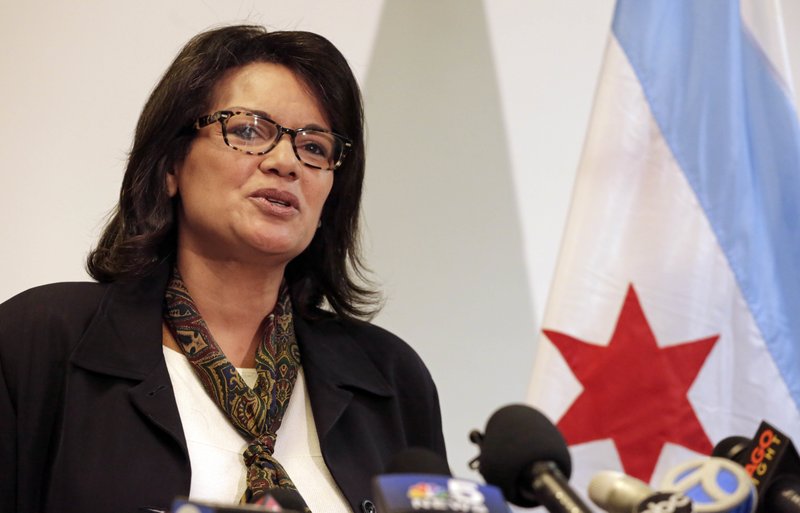CHICAGO -- Authorities released hundreds of videos Friday that offer glimpses into 101 encounters involving Chicago police.
One of the videos shows an officer slamming a woman face-first into the hood of a car during a party in a West Side neighborhood in July 2014. The officer, baton in hand, screams at the crowd: "Get out of the street or you're going to jail," and slams the weapon into the side of a man's head so hard his hat flies off. The city paid each of them $50,000 to settle a lawsuit.
Another clip shows officers firing at a van as it barrels in reverse out of an electronics store. The driver, suspected of robbery, was killed.
Other video shows officers struggling to subdue a shirtless man on a sidewalk even after shooting him twice. The man, accused of attacking bus passengers, was also hit with a stun gun once on the scene and three more times while being transported in an ambulance, authorities said.
The more than 300 video clips -- along with audio recordings and police reports -- are from occurrences investigated by the Independent Police Review Authority. The agency examines misconduct cases and any instance -- justified or not -- of an officer firing a gun in a manner that could injure someone.
The release marks the start of a new city policy to make public all video in police shootings and other incidents within 60 days as part of an effort to restore public trust in its beleaguered police force.
The video was captured by police dashboard and body cameras as well as surveillance cameras and bystanders recording on cellphones. Thirty of the 101 cases involve deaths, said review authority spokesman Mia Sissac.
Releasing records related to open investigations is nearly unprecedented in a city where the Police Department for decades had a reputation for secrecy. City Hall fought the release of video showing a white officer shooting black teenager Laquan McDonald 16 times in October 2014. A judge had to compel the city to make it public in November, and the images set off protests forcing steps toward more openness and sweeping changes in the police department.
"These past few months, as the city has struggled with so many questions about policing and about police accountability, it has been clear that we all agree that there's a lack of trust and that increased transparency is essential to rebuilding that trust," said Sharon Fairley, head of the Independent Police Review Authority. "Today represents an important first step toward that end."
There was no initial indication that any of the footage was as explosive as the dash-camera video showing the death of McDonald. The officer who shot him, Jason Van Dyke, was charged with first-degree murder just hours before the video was released, and a Cook County judge said Thursday that he would appoint a special prosecutor to handle the case.
Many of the cases involved in Friday's release do not include video, and much of the video in the files does not show what actually happened, capturing only the aftermath.
Since the uproar over the McDonald video, the city has released police reports on that case and thousands of emails between Mayor Rahm Emanuel's office, the Police Department and the review authority.
Emanuel praised Friday's release but said, "We know there is a lot more work to do."
Emanuel announced in May that he is abolishing the review authority and replacing it with a civilian department that he said will have more independence and resources to do its work.
In some cities, such as Seattle, nearly all police video is posted online almost immediately. But elsewhere around the country, the public often must wait months or years to gain access to the videos. In some places, the video is never released.
The Chicago police union opposed the release, saying in many cases the videos don't tell the full story. Dean Angelo, president of the Fraternal Order of Police, Chicago Lodge #7, said some of the incidents occurred up to five years ago, and in some cases the officers involved still haven't been interviewed by investigators. Some of the videos are only partial clips of what happened, and don't include audio.
"The concern is they're putting this out there, and [the officers'] kids and neighbors are going to see it, and we're not getting the entire incident," Angelo said.
A Section on 06/04/2016
